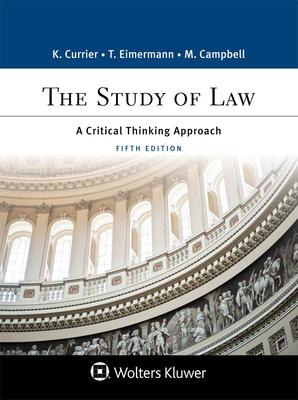[Read] PDF/Book The Study of Law: A Critical Thinking Approach (Aspen College)Katherine A. Currier

Ebook PDF The Study of Law: A Critical Thinking Approach (Aspen College) | EBOOK ONLINE DOWNLOAD
If you want to download free Ebook, you are in the right place to download Ebook. Ebook/PDF The Study of Law: A Critical Thinking Approach (Aspen College) DOWNLOAD in English is available for free here
[Download] Link : [Downlload Now] The Study of Law: A Critical Thinking Approach (Aspen College)
Read More : [Read Now] The Study of Law: A Critical Thinking Approach (Aspen College)
Description
Proven effective in the classroom, The Study of Law: A Critical Thinking Approach, now in its Fifth Edition, brings real-world perspective to understanding basic legal concepts and the mechanics of the American legal system. The authors’ acclaimed critical thinking approach actively engages students in the process of legal reading, analysis, and critical thinking. The text offers a thorough introduction to core topics and concepts, including sources and classifications of law, the structure of the court system, civil litigation and its alternatives, analyzing and interpreting the law, and substantive law. New to the Fifth Edition: Streamlined with the student in mind. For example, an enhanced explanation of how to brief a case in Chapter 1 (Introduction to the Study of Law), and a clearer discussion of executive orders and memoranda in Chapter 2 (Functions and Sources of Law). Chapter 5 on Civil Litigation and Its Alternatives is edited to focus on the key topics. Updated throughout,
including: Chapter 6 (Constitutional Law): Packingham v. North Carolina regarding First Amendment rights as they relate to the internet; Masterpiece Cakeshop Ltd. v. Colorado Civil Rights Commission, addressing the balancing act between giving states the right to legislate for the general public good and the individual right to express religious beliefs; American Legion v. American Humanist Association with examples of how the Supreme Court applies the Lemon test; and an enhanced discussion of the internet and the U.S. Constitution. Chapter 7 (Torts): Contemporary torts related to the #MeToo movement, cyberbullying, and cybertorts. Chapter 9 (Property and Estate Law): Matal v. Tam and expanded discussion of cases related to the Lanham Act. Chapter 10 (Laws Affecting Business): New coverage of public benefit corporations and the Family Medical Leave Act. Chapter 11 (Family Law): expanded discussion of Obergefell v. Hodges; Terrell v. Torres; and new discussion of DNA testing and its impacts on family law. Chapter 12 (Criminal Law): Commonwealth v. Carter Chapter 13 (Criminal Procedure): Mitchell v. Wisconsin regarding blood testing without a warrant; Carpenter v. U.S. regarding use of cell-site locations without a search warrant New co-author, Marisa Campbell, brings her extensive teaching experience to the book. Professors and students will benefit from: Critical thinking approach introduces students to the study of law, encouraging them to interact with the materials through hypothetical scenarios and exercises, realistic examples, discussion questions and legal reasoning exercises. Strong pedagogy reinforces well-written text presented in an accessible and well-organized format. Edited cases in every chapter teach students how to read and analyze the law. Thorough introduction to substantive law, with chapters on torts, contracts, property and estate law, business law, family law, and criminal law and procedure, and professional responsibility and ethics.
